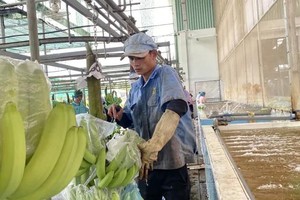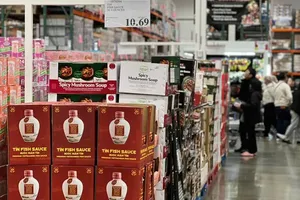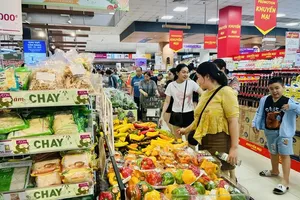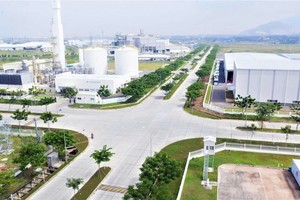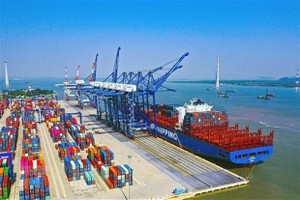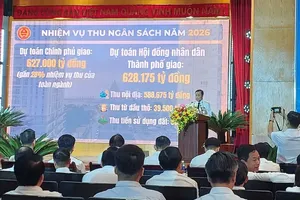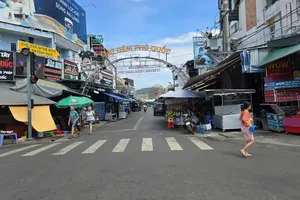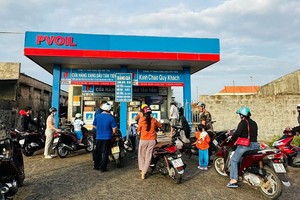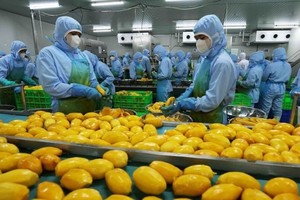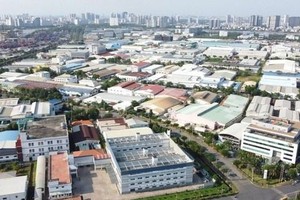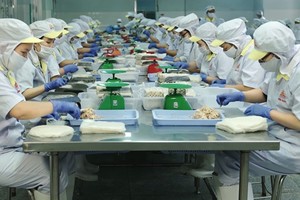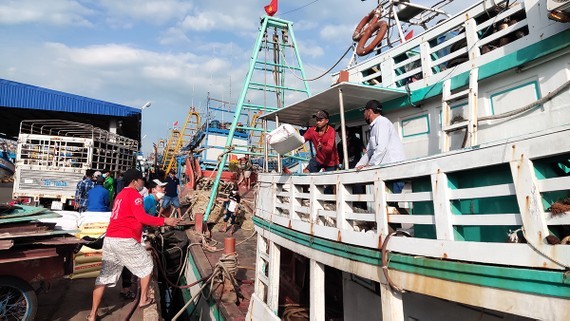
Since the beginning of this August, at the seaports of Sa Ky (Quang Ngai Province), Tam Quan Bac, De Gi, Quy Nhon (Binh Dinh Province), it has been easy to spot hundreds of fishing boats coming to sell fish to wholesale buyers, while other boats are preparing essential commodities for their new trips.
46-year-old fisherman Nguyen Van Muoi from Hoang Mai Town of Nghe An Province happily shared that he has just come ashore to sell 40 tonnes of squid and 10 tonnes of fish. When the oil price increased last month, it took him nearly VND300 million (US$12,800) to buy fuel. Luckily, the last trip was bountiful, and his profit came to VND300 million.
Packing next to Muoi’s boat is the boat of 43-year-old Chuong Van Thanh from Hai Cang Ward of Quy Nhon City. He is buying the last items for his upcoming fishing trip, and is in high spirit thanks to the fuel price drop.
Along fishing ports of Binh Thuan Province – one of the three major fishing grounds of Vietnam – the bustling and eager spirit can also be felt among fishermen. Tran Thanh Nhan from Phan Thiet City and his 20 friends are busy moving necessary items onto their boat for their offshore fishing trip. He shared that a significant oil price decrease recently can save fishermen tens of millions of VND per trip.
Statistics from Binh Thuan Province reveal that out of the current 7,500 licensed fishing boats of the province, 2,000 are over 15 meters long for offshore fishing trips. When the oil price was so high last month, around 1,200 boats had to stay at home, severely affecting the life of their owners. Now that the price remarkably drops, along with favorable weather conditions and the main Southern fishing season has come, all fishermen are extremely eager to resume their work.
A similar state can be seen in Dong Hai fishing port in Phan Rang City of Ninh Thuan Province and Cat Lo fishing port in Vung Tau City of Ba Ria – Vung Tau Province. Fishing boat owner Le Hoang Thuy informed that last year, a 2-to-3-month trip cost him VND550-700 million ($23,500-30,000). This year, due to unexpected increases in oil price by 40-50 percent, he decided to stay home. But now, with such a strong fall in fuel price, he quickly resumes his work when the main Southern fishing season has come.
Vice Chairman of Ba Ria – Vung Tau Province Fisheries Department Nguyen Duc Hoang informed that 60 percent of the total quantity of fishing boats in the province have resumed their trips.
Nguyen Van Phinh from Phu Tan District of Ca Mau Province said that his boat came ashore 2 days ago, and after deducting all costs, his profit reached VND10 million ($427.5), which is quite acceptable compared to having nothing to do to care for his family.
The main Southern fishing season lasts from May to October each year. This is the main working time of fishermen in the Mekong Delta. Adding to that is a timely oil price drop, greatly relieving the cost burden off fishermen.
Kien Giang Province now has 9,800 licensed fishing boats, including nearly 3,900 boats with a length of over 15m for offshore trips. Chairman of the provincial Fisheries Department Kim Hoang Thanh commented that even with such a fuel price drop, many fishermen still encounter difficulties since the prices of other fishing gears are still rather high, while seafood prices are seeing a drop and the current fishing grounds are depleting.
Deputy Director of Kien Giang Province Department of Agriculture and Rural Development Quang Trong Thao stressed that for long-term effective exploitation of fisheries, there must be a study on strengths and weaknesses of the region as to onshore and offshore exploitation to restructure this industry for a more sustainable development. Along with that is the construction and management of aquatic resources protection zones to restore exploited volumes. The implementation of suitable preservation technologies on fishing boats must be focused on to improve product quality and minimize loss.
